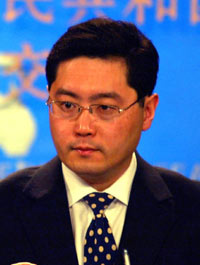Japan should have consulted China before freezing loans, the Foreign Ministry
said yesterday.
Tokyo's unilateral decision to suspend an agreement on yen loans contributes
little to the improvement of chilly bilateral ties, ministry spokesman Qin Gang
said at a regular news conference in Beijing.

Chinese Foreign Ministry Spokesman Qin Gang
[newsphoto/file] |
"Such an agreement (on loans)
is mutually beneficial," Qin said. "It is not charity given by one country to
another."
A Japanese diplomat announced yesterday that the government was freezing
loans to China at least till the end of this month because of worsening
relations between the two nations.
Also yesterday, Chief Cabinet Secretary Shinzo Abe told a news conference in
Tokyo that Japan would not lend any more to China during the current fiscal
year, which ends on March 31, but may start releasing the loans next month if
the situation improves.
Relations between China and Japan have soured because of various issues
including Japanese Prime Minister Junichiro Koizumi's repeated visits to the
Yasukuni Shrine, a symbol of Japan's past militarism, and the dispute over gas
exploration rights in the East China Sea.
"We should have exchanges and consultations over differences and problems;
and properly resolve those issues," Qin said. "As for Japan's loan to China, we
think this issue should also be resolved in line with this principle."
At the news briefing, Qin also opposed a Japanese proposal to revamp UN
funding which would impose higher dues on some of the permanent members of the
Security Council.
Japan's suggestion on membership dues is an attempt to use the so-called
funding-responsibility concept to reject the widely-accepted funding-ability
principle, Qin said.
The proposal links "power" in the council to "membership dues" and tries to
pave the way for its permanent membership in the council by means of "money for
power," he said.
"It violates the basic principle of equality in sovereignty that is stated in
the UN Charter and seriously damages the interests of developing countries," Qin
said.
Earlier this month, Japan submitted a proposal to the world body asking each
permanent member to pay at least 3 to 5 per cent of the UN budget. The proposal
has also faced opposition from Russia and the United States.
China makes an important contribution to the UN as the No 9 payer, Qin said.
Hu's US visit
Qin also said that President Hu Jintao would pay a state visit to the United
States in mid or late April.
Hu will exchange views with US President George W. Bush on Sino-US relations
and important international and regional issues of common concern, Qin
said.